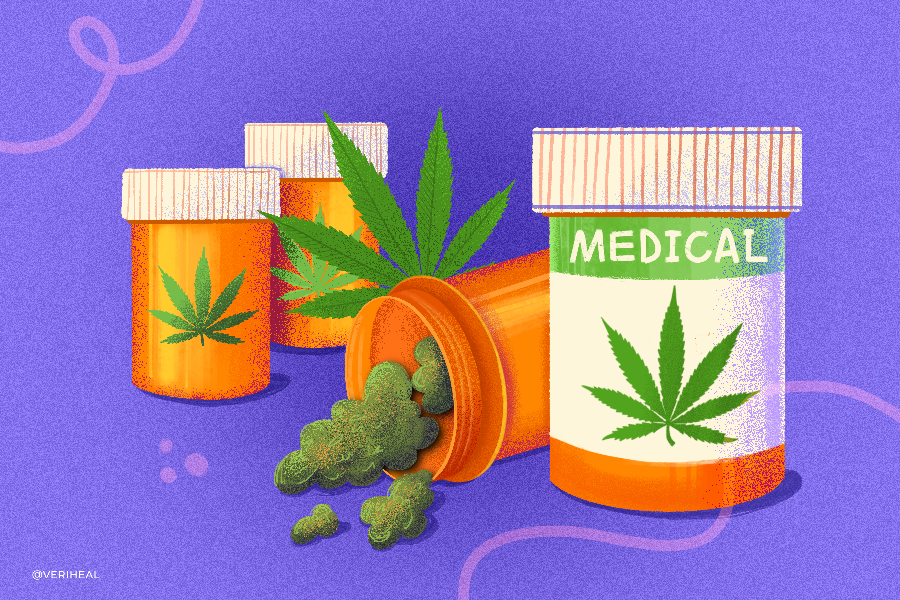With the growing acceptance and legalization of cannabis, the pharmaceutical industry is taking serious hits, according to a 2022 novel study into the impact of cannabis legalization on pharmaceutical firms. On top of recognizing the vast scope of benefits cannabis can provide, patients are saving lots of hard-earned money by swapping their pills for cannabis. Let’s take a closer look at the situation.
What Is the Pharmaceutical Industry?
The pharmaceutical industry, also sometimes called “Big Pharma,” refers to the economic circle that is concerned with the discovery, development, and manufacture of drugs and medications (i.e., pharmaceuticals). This industry benefits from illness and injury, as people become reliant on their products—which often come with enormous costs—for symptom relief. The pharmaceutical industry is necessary, but many question the enormous power and profit of these companies.
The pharmaceutical industry includes public and private companies such as AstraZeneca, Pfizer, Austell, and Biocon. People often associate pharmaceuticals with being man-made, but some pharmaceutical companies are developing medications made with natural ingredients. Still, most pharmaceuticals are heavily processed.
Some might say medical marijuana (MMJ) companies should fall under the umbrella of the pharmaceutical industry considering the industry’s definition. For now, though, MMJ is viewed as a competitor to traditional medicine, and its success only continues to hurt Big Pharma.
The Impact of Cannabis Legalization on Big Pharma
The team that conducted the study looked at stock return and prescription drug sales data for 556 pharmaceutical companies. The team also analyzed market trends before and after the implementation of medical and recreational cannabis legalization. The team found that “cannabis legalization is associated with a decrease in the stock market returns for pharmaceutical firms” as well as reduced annual sales by $3 billion on average.
The researchers stated:
“By expanding access and, thus, use, legalization could permit cannabis to compete with conventional pharmaceuticals. Largely unpatentable, cannabis may act like a new generic entrant following medical legalization, leading some individuals to substitute away from other drugs toward cannabis. However, unlike a conventional new generic drug, cannabis use is not restricted to a single or limited set of conditions. This means that cannabis acts as a new entrant across many different drug markets simultaneously.”
Why Patients Are Choosing MMJ Over Pharmaceuticals
As for the people aspect, many patients are doing away with pharmaceuticals and are choosing cannabis instead. Legal medical cannabis has been associated with reductions in pharmaceutical prescriptions, especially for opioids. According to a 2021 study published in the Journal of the American Academy of Orthopedic Surgeons, opioid addiction remains a significant national concern, but access to MMJ has led to a 19.7% reduction in daily doses of opioids.
Check out this article to learn more about replacing opioids with MMJ: Marijuana vs. Opioids: Which Is More Effective for Treating Pain?
However, it’s not just opioids being done away with. According to a study published in HealthAffairs, “…the use of prescription drugs for which marijuana could serve as a clinical alternative fell significantly, once a medical marijuana law was implemented.” If you think about the many kinds of pharmaceuticals that MMJ could theoretically replace, from painkillers to anti-inflammatories to sedatives, you get an idea of how comprehensive that list could be.
Why You Should Get Your Medical Marijuana Card
Veriheal has satisfied millions of patients nationwide by giving them access to these benefits
- Larger purchase limits
- Peace of mind
- Enhanced legal protection
- Access to higher potency strains
- Save up to 25% on cannabis purchases
- Skip the line at the dispensary
Here are some of the main reasons patients are switching from pharmaceuticals to cannabis for a variety of conditions.
Origin
Pharmaceuticals are man-made products, regardless of whether they contain organic or synthetic ingredients, whereas cannabis in its purest form is completely natural. It should be noted that there is a gray area of cannabis-based pharmaceuticals, such as Sativex, but these products still come with much fewer side effects than traditional pharmaceuticals.
Side Effects
A recent study found an indication of “a potential harm reduction opportunity, as pharmaceutical drugs often come with dangerous side effects or—as with opioids—potential for misuse.” The researchers found that cannabis led to “significant reductions in the volume of prescriptions within the drug class that align with the medical indications for pain, depression, anxiety, sleep, psychosis, and seizures.”
It is no secret that pharmaceuticals have far worse side effects when compared to medical-grade cannabis, despite the fact that they both provide relief. For more information on this, be sure to check out this article.
Expense
Depending on where cannabis is bought, it can be expensive, ranging from $5-20 per gram. However, Americans “spend more on prescription drugs—average costs are about $1,300 per person per year—than anyone else in the world.” According to Bloomberg, the average cost per person (per capita) of Americans is followed by Germany ($947.8 per capita), Canada ($839.4 per capita) and South Korea ($713 per capita).
Bloomberg explains that pharmaceutical companies “raised prices ‘with abandon’ using anticompetitive strategies and manipulating the patient system and marketing exclusivity granted by regulators to do so.” Medical cannabis can offer patients an opportunity to save, as its costs are less than the astronomically extensive pharmaceuticals. Where allowed, patients can also cut costs by growing their own supply.
Final Thoughts
Considering the naturality of cannabis, the broad scope of benefits it offers, and the lessened costs of MMJ compared to pharmaceuticals, it’s no wonder that patients are switching to medical cannabis left and right. For too long, cannabis wasn’t a medical option for patients, but it’s quickly becoming legalized throughout the U.S. and beyond. The medical cannabis and pharmaceutical industries are battling it out now, but perhaps we’ll see a day when they work together.
Are you interested in testing out the benefits of medical cannabis yourself? Book an appointment today with a licensed MMJ doctor in your state.
Author, Share & Comments








